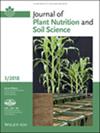Enhanced Carbon Sequestration and Microbial Activities Under Apple-Based Agroforestry Systems in Kullu Valley of Himachal Pradesh
Abstract
Background
Integrating fruit trees is among the promising agroforestry technologies. Intercropping of fruit trees with remunerative crops, particularly vegetables, could generate higher income for farmers.
Aim
The present study involves the assessment of apple-based agroforestry systems integrated with various agricultural crops such as black gram, capsicum, tomato, and brinjal and evaluated the effect of integrated farming on soil properties, microbial biomass, and enzyme activities.
Methods
The experiment was conducted in Randomized Block Design by considering sole apple, sole tomato, sole brinjal, sole capsicum, sole black gram, apple + tomato, apple + brinjal, apple + capsicum, and apple + black gram as treatments.
Results
The study revealed the performance of the agroforestry system where apple and tomato in combination perform better than others and sole cropping. The competition for moisture, nutrients, and other limiting resources in agroforestry system where apple trees are grown in combination with brinjal, capsicum, and black gram resulted in poor plant's growth and yield. This combination of crops also significantly affected the organic carbon, porosity, bulk, and particle densities. The available N, P, and K contents decreased with the increased soil depth. It was observed that microbial biomass in terms of carbon (Cmic), nitrogen (Nmic), and phosphorus (Pmic) was higher where tomato was grown in apple-based agroforestry systems than in sole cropping. Higher enzymatic activities for acid and alkaline phosphatase, catalase, and dehydrogenase were recorded in agroforestry system where tomatoes were grown in the presence of apple trees.
Conclusions
The results reported that a combination of apple and tomato is the most successful system as tomato crop performs better under the apple tree canopy, possibly due to the favorable microenvironment and tree-crop compatibility.

 求助内容:
求助内容: 应助结果提醒方式:
应助结果提醒方式:


